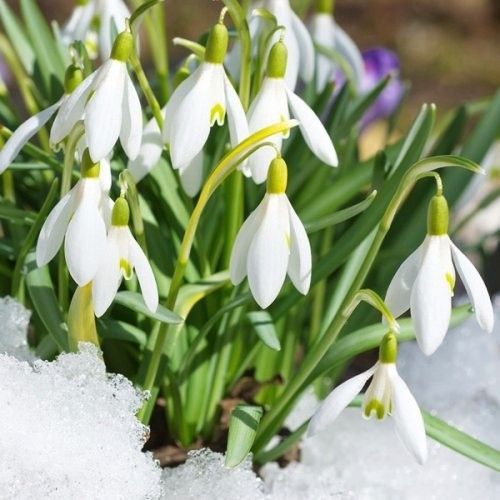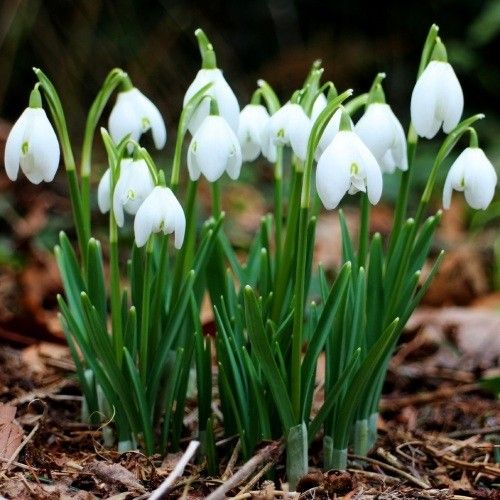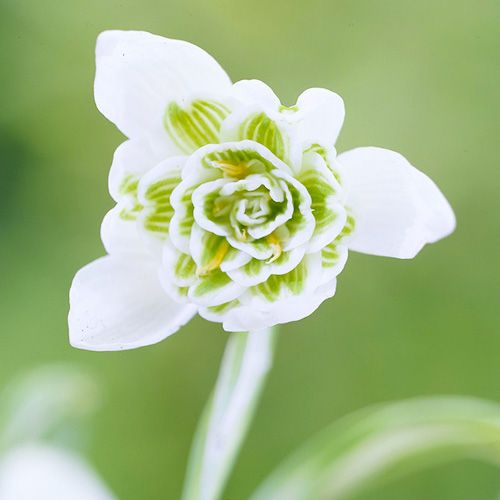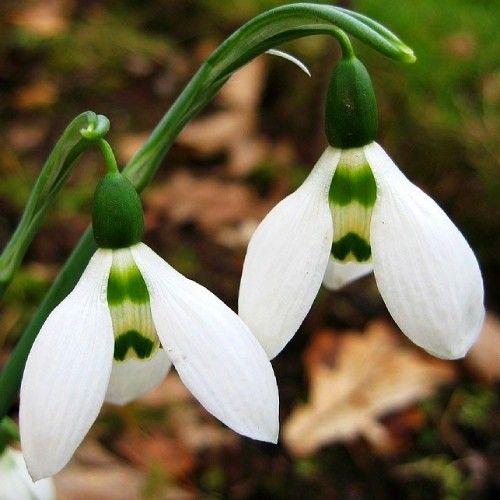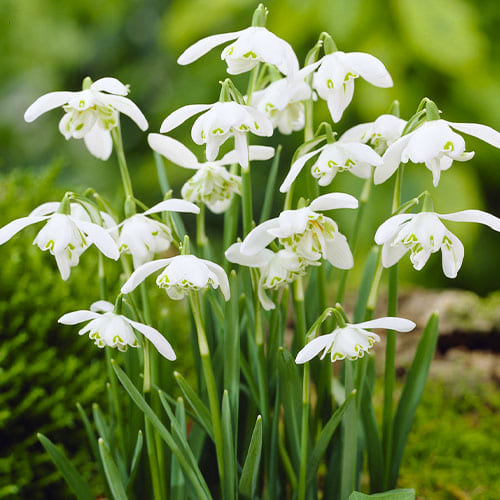
Galanthus
GALANTHUS
Last Reviews
Galanthus: Graceful Snowdrops for Your Garden
As winter fades and spring approaches, gardeners eagerly await the delicate beauty of the galanthus flower. Commonly known as snowdrops, galanthus bulbs are a must-have for any garden. In this article, we will explore the unique characteristics of the galanthus flower, provide tips on planting and caring for galanthus bulbs, and suggest design ideas to incorporate this stunning flower into your home interior or garden.
The Allure of Galanthus Flowers
Galanthus flowers are a sight to behold. Their delicate white petals and green markings gracefully emerge from the snow, signaling the start of spring. Galanthus flowers are also prized for their sweet fragrance, which attracts early pollinators like bees and butterflies.
Varieties of Galanthus Bulbs
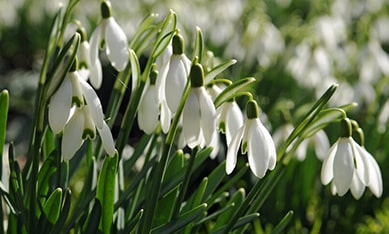
There are over 20 species of galanthus bulbs, each with its own unique characteristics. Some popular varieties include:
- Galanthus nivalis: the most common and earliest blooming variety
- Galanthus elwesii: larger flowers and leaves than other varieties
- Galanthus woronowii: fragrant flowers with a distinct V-shaped green marking
Each variety of galanthus bulbs has its own unique characteristics that make it a great choice for any garden. For example, Galanthus nivalis is a great choice for gardeners who want to enjoy snowdrops as early as possible since it is the earliest blooming variety. Galanthus elwesii is a perfect choice if you want larger flowers and leaves than other varieties, while Galanthus woronowii is a fragrant variety with a distinct V-shaped green marking that adds a touch of elegance to any garden.
Unique Characteristics of Galanthus Blooms
Galanthus flowers are known for their unique characteristics, including:
- Hanging appearance, with flowers drooping from a single stem
- Three outer petals and three inner petals
- Green markings on the inner petals, which help pollinators identify the flower
The unique characteristics of galanthus blooms make them a highly sought-after flower. Their hanging appearance is particularly eye-catching, making them a popular choice for gardeners who want to add a touch of elegance to their garden. The three outer petals and three inner petals are also unique, giving the flowers an intricate and delicate look. Finally, the green markings on the inner petals are not only beautiful but also serve a functional purpose by helping pollinators identify the flower.
Planting and Growing Galanthus Bulbs
Galanthus bulbs are easy to plant and care for, making them a great choice for novice gardeners.
Choosing the Right Location
Galanthus bulbs thrive best in partially shaded areas with well-draining soil. However, they can also tolerate full sun conditions as long as the soil remains adequately moist. When selecting a spot for your galanthus bulbs, consider their blooming season, which occurs in late winter or early spring. It is advisable to plant them in a location where you can fully appreciate their delicate beauty during that time.
Preparing the Soil for Galanthus Bulbs
Prior to planting galanthus bulbs, it is crucial to prepare the soil appropriately. Enhance soil drainage and nutrient levels by incorporating organic matter such as compost or peat moss. This preparatory step will guarantee that your galanthus bulbs receive the necessary nutrients for optimal growth and flourishing.
Planting Techniques for Galanthus Bulbs
For ideal results, it is recommended to plant Galanthus bulbs in autumn, prior to the arrival of the first frost. Begin by digging a hole approximately 3-4 inches deep. Place the bulb in the hole with the pointed end facing upwards. Proceed to cover the bulb with soil and water it thoroughly. To allow ample room for growth, ensure that you space out the Galanthus bulbs around 3 inches apart from each other.
Caring for Galanthus Bulbs
While Galanthus bulbs are generally low-maintenance, there are a few key considerations to bear in mind.
Watering and Mulching
To promote the health and vigor of your Galanthus bulbs, it is crucial to maintain adequate moisture in the soil. Regularly water the bulbs to prevent the soil from drying out. Applying a layer of mulch around the bulbs serves multiple purposes, such as retaining moisture in the soil and suppressing weed growth. These measures will contribute to the overall well-being of your Galanthus bulbs, keeping them healthy and robust.
Protection from Extreme Temperatures
While Galanthus bulbs can withstand cold temperatures, its important to note that excessive heat can cause the flowers to wilt. To safeguard them from the sun, it is advisable to plant them in a partially shaded location. If you reside in an area with harsh winter conditions, providing protection from the cold becomes crucial. Consider covering your Galanthus bulbs with a layer of mulch to shield them from the cold temperatures. This will help ensure their well-being and promote successful growth.
Dividing and Propagating Galanthus Bulbs
To maintain healthy growth and prevent overcrowding, it is recommended to divide Galanthus bulbs every few years. Wait until the foliage has completely died back before proceeding with division. Carefully dig up the bulbs and separate them into smaller clumps. When replanting the divided bulbs, choose a new location that provides sufficient space for their growth. Ensuring proper spacing is important for their well-being and continued vitality.
Design Ideas with Galanthus
Galanthus flowers are a versatile addition to any garden. Consider planting them in:
1. Borders and beds
2. Rock gardens
3. Under deciduous trees
Galanthus flowers also make beautiful cut flowers, adding a touch of elegance to any floral arrangement. If youre looking for design ideas to incorporate galanthus flowers into your home interior, consider using them in a floral centerpiece or as a decorative accent on a coffee table or mantle.
Where to Buy Galanthus Bulbs
Galanthus bulbs are widely available for purchase at garden centers and through online retailers. When selecting bulbs, opt for ones that are firm, plump, and free from any indications of mold or damage. If youre uncertain about where to buy galanthus bulbs, seeking recommendations from local gardeners or nurseries can be beneficial in finding reputable sources.
Conclusion: Embrace the Delicate Beauty of Galanthus in Your Garden
Galanthus flowers possess a captivating charm and delightful fragrance, making them a captivating inclusion in any garden. With the valuable insights shared in this article, you can relish in the timeless beauty of galanthus bulbs for many years. Whether youre a novice or seasoned gardener, galanthus bulbs are an essential addition to any garden. Dont hesitate any longer embark on planting your galanthus bulbs today and savor the elegance of these graceful snowdrops flourishing in your garden!
Frequently asked questions about Spring Flowering Galanthus
How to plant gladiolus bulbs?
To plant gladiolus bulbs, follow these steps:
- Choose a sunny location with well-drained soil.
- Dig a planting hole that is about two to three times as deep as the height of the bulb.
- Place the bulb in the planting hole with the point facing upwards.
- Fill the hole with soil and press down lightly to stabilise the onion.
- Keep the soil evenly moist, but avoid overwatering.
When to plant gladiolus bulbs?
Gladiolus bulbs are usually planted in spring when the soil has warmed up and the risk of frost has passed. Depending on the climate, this can be in early spring or late spring.
How deep to plant gladiolus bulbs?
Gladiolus bulbs should be planted about 10 to 15 cm deep in the ground. The exact depth may vary, depending on the size of the bulbs. Some varieties may have specific instructions on planting depth.
How to store gladiolus bulbs?
After flowering and the foliage has died back, gladiolus bulbs can be dug up and stored. Carefully remove excess soil and dry the bulbs in a cool, dry place. Store them in an airtight bag or container with a desiccant to keep moisture out. Check regularly for signs of rot or damage.
When to dig up gladiolus bulbs?
Gladiolus bulbs can be dug up in autumn after the foliage has died back completely. However, wait at least two weeks after the foliage has wilted to ensure that the bulbs have had sufficient time to store nutrients. Dry and store the bulbs in a cool, dry place until they are planted again next spring.











